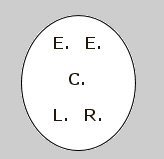

EBENEZER ELLIOTT
(1781 - 1849)
Three Letters of 1849
to James Wilson
|
|
"His face beamed with intelligence and good nature on that day, at least, though the prevailing expression was that of a man cast in a mould of sorrow, due to whom melancholy was the most familiar spirit. But he was easily quickened into animation by anything that either pleased or offended him. His appearance was rather uncouth, though doubtless when "trimmed up" he would have been more presentable at an evening party than he was on the occasion under notice. His appearance was even singular. He wore a dressing gown and slippers, the former fastened up nearly to his chin, but not so high as to conceal the fact that he wore no collar or tie of any kind on his neck; his idea, no doubt, was to be frequently comfortable. In character with his attire was his head, his hair being cut short, and did not seem to receive much of his attention. His chin showed the stubble of two day's growth and his whiskers were on a limited scale."
|
"Joy may be my fount of tears" is not poetry, I know not what poetry is. We have a stranger's bed that will hold two comfortably if they are "cuddlers." So when you come again this way I trust you will bring Mary with you.
Yours very truly
EBENEZER ELLIOTT |
|
Your lines addressed to _______ are glorious. I know not whatt you call them. But you must change a word or two. Remember me to Mr Birks. We were all greatly pleased with him.
Yours very truly EBENEZER ELLIOTT
|
"As it is, the poet lives in his works. And though some of them are of a kind that could only have a temporary or historical interest, he has left other poems that deserve a place in the English classics. His labours in opposition to the Corn Laws long before Cobden and Bright were heard of entitle him to the greatful remembrance of the British people. He was always proud of his title, the Corn Law Rhymer; sealing his letters with a large seal - "
The seal is reproduced here as shown in the
Sheffield Daily Telegraph; it's actual size & colour have to be imagined. It
is notable that Wilson does not make any mention of Elliott
signing his letters "Ebenezer Elliott, CLR" - possibly the poet's use of
the seal is confused with the CLR signature myth. However, the seal shown
below is a first for the literature surrounding the Corn Law Rhymer.

To return to Ebenezer Research Foundry,
please strike the anvil 